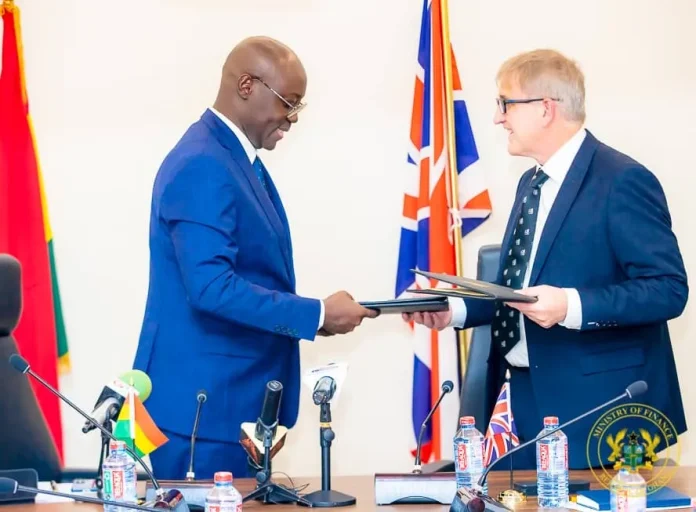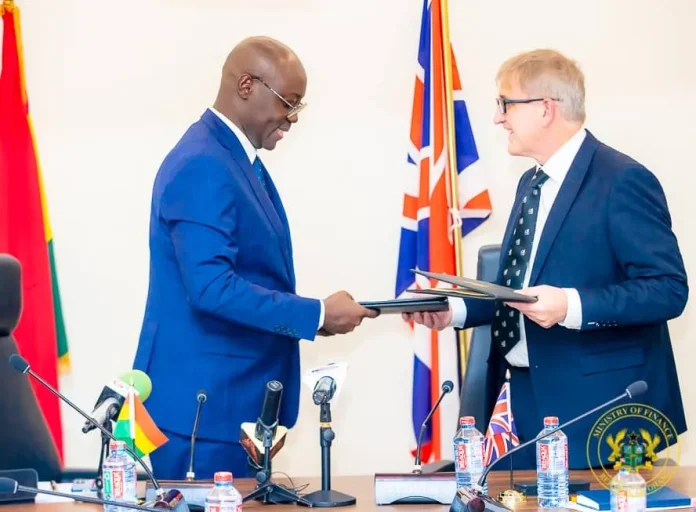
Ghana has achieved a critical breakthrough in its debt restructuring program by securing a bilateral agreement with the United Kingdom to reschedule over $256 million in debt across 15 years, unlocking five major infrastructure projects that had stalled due to financial constraints.
The agreement signed in Accra by Finance Minister Dr. Cassiel Ato Forson and His Majesty’s Trade Commissioner for Africa John Humphrey will enable Ghana to reschedule bilateral debt over 15 years as part of the external debt restructuring program, marking the country’s third major bilateral restructuring achievement.
The deal represents more than financial relief, directly unlocking five critical UK-backed projects: the 109-kilometer Bolgatanga-Bawku-Pulmakom Road Project, Obetsebi Lamptey Interchange Phase II, Kejetia Market Phase II, Komfo Anokye Teaching Hospital Maternity Unit, and Phase I of the Tema-Aflo Road Project.
Dr. Forson emphasized the agreement’s significance for Ghana’s economic recovery trajectory, noting that inflation is approaching single digits while debt levels decline and growth rebounds, particularly in real sector employment creation. Recent Bank of Ghana data shows public debt fell dramatically to 43.8% of GDP by June 2025, down from 55% in March, exceeding government targets ahead of schedule.
The broader debt restructuring strategy aims to reduce the debt-to-GDP ratio to 55% and cut debt-service-to-revenue below 18% by 2028, representing the clearest indication that President John Mahama’s administration is successfully moving beyond the country’s 2022 default on most of its $30 billion external debt.
Humphrey described the signing as a landmark moment in UK-Ghana relations, emphasizing that the agreement creates fiscal space for Ghana’s bold economic vision, including the 24-hour economy initiative and infrastructure development programs under the government’s “big push” agenda.
UK Export Finance is restarting five facilities supporting Ghana’s priority projects, with the restructuring deal unlocking up to £170 million additional funding to complete critical infrastructure undertaken by UK exporters. These projects will drive economic growth while creating employment opportunities and strengthening Ghana’s developmental foundations.
The agreement follows Ghana’s successful completion of comprehensive debt restructuring negotiations. Ghana previously struck deals with creditors to restructure $5.4 billion of bilateral loans after months of negotiations with Paris Club creditors and others, including China, constituting significant steps toward restoring long-term debt sustainability.
President Mahama, speaking at African Development Bank meetings in Abidjan, credited the debt-to-GDP improvement to restructuring agreements with creditors, demonstrating coordinated progress across multiple bilateral relationships supporting Ghana’s economic recovery.
The UK deal signals confidence from bilateral partners in Ghana’s economic management under the International Monetary Fund (IMF) Extended Credit Facility program. Dr. Forson emphasized that UK support should encourage other bilateral creditors still negotiating with Ghana to finalize similar agreements.
Infrastructure project resumption addresses critical developmental gaps across Ghana. The Bolgatanga-Bawku-Pulmakom Road improves northern region connectivity, while the Obetsebi Lamptey Interchange and Tema-Aflo Road projects enhance Greater Accra transportation networks. The Kejetia Market expansion supports commercial activities in Kumasi, and the Komfo Anokye hospital project strengthens healthcare infrastructure.
Recent World Bank data shows inflation reached 23.8% by end-2024, driven by food prices and currency depreciation, with the Cedi depreciating 19.0% against the US dollar. However, economic indicators suggest stabilization as debt restructuring agreements take effect.
The agreement represents broader normalization of Ghana’s international economic relationships following the 2022 fiscal crisis. UK Export Finance’s willingness to restart facilities demonstrates restored confidence in Ghana’s creditworthiness and economic management capacity.
Humphrey emphasized that the partnership extends beyond financial arrangements to encompass confidence, shared ambition, and transformation-focused trade relationships. The deal positions Ghana to attract additional investment while demonstrating that effective debt restructuring can restore bilateral economic cooperation.
Success will depend on Ghana’s ability to maintain fiscal discipline while executing infrastructure projects efficiently. The government must balance development spending with debt sustainability requirements under IMF program conditionalities.
The UK agreement joins other bilateral restructuring successes as Ghana rebuilds its external debt profile. The World Bank Group has welcomed agreements reached under the G20 Common Framework as representing critical milestones toward restoring debt sustainability consistent with joint World Bank-IMF debt sustainability frameworks.
Dr. Forson assured that the government will implement necessary measures to begin facility disbursements and project execution promptly, emphasizing continued partnership with the UK as demonstration of confidence in Ghana’s economic reset progress.
The infrastructure project resumption provides immediate economic benefits through construction employment while delivering long-term developmental impacts across transportation, healthcare, and commercial sectors essential for sustained economic growth.
Industry observers view the UK agreement as establishing momentum for completing Ghana’s bilateral debt restructuring program, potentially accelerating similar deals with remaining creditor nations and fully normalizing the country’s external debt relationships.
